Public and Private Law: Understanding New Zealand's Legal Framework
VerifiedAdded on 2023/06/11
|6
|1299
|346
Essay
AI Summary
This essay provides an overview of the legal system in New Zealand, focusing on the bifurcation between public and private law. Public law, which governs the relationship between the state and its citizens, is exemplified by constitutional and criminal law, with the Crimes Act 1961 defining criminal law and prescribing punishments. Private law, on the other hand, defines the rights and obligations between individuals, including laws regulating contracts, property, and corporate activities, as seen in the Contract and Commercial Law Act 2017, the Property Law Act 2007, and the Companies Act 1993. The essay concludes that public law defines the rights of individuals in relation to the state, while private law governs transactions and interactions between individuals, each playing a crucial role in New Zealand's legal framework. The essay references several key legal texts and statutes to support its analysis of the New Zealand legal landscape.
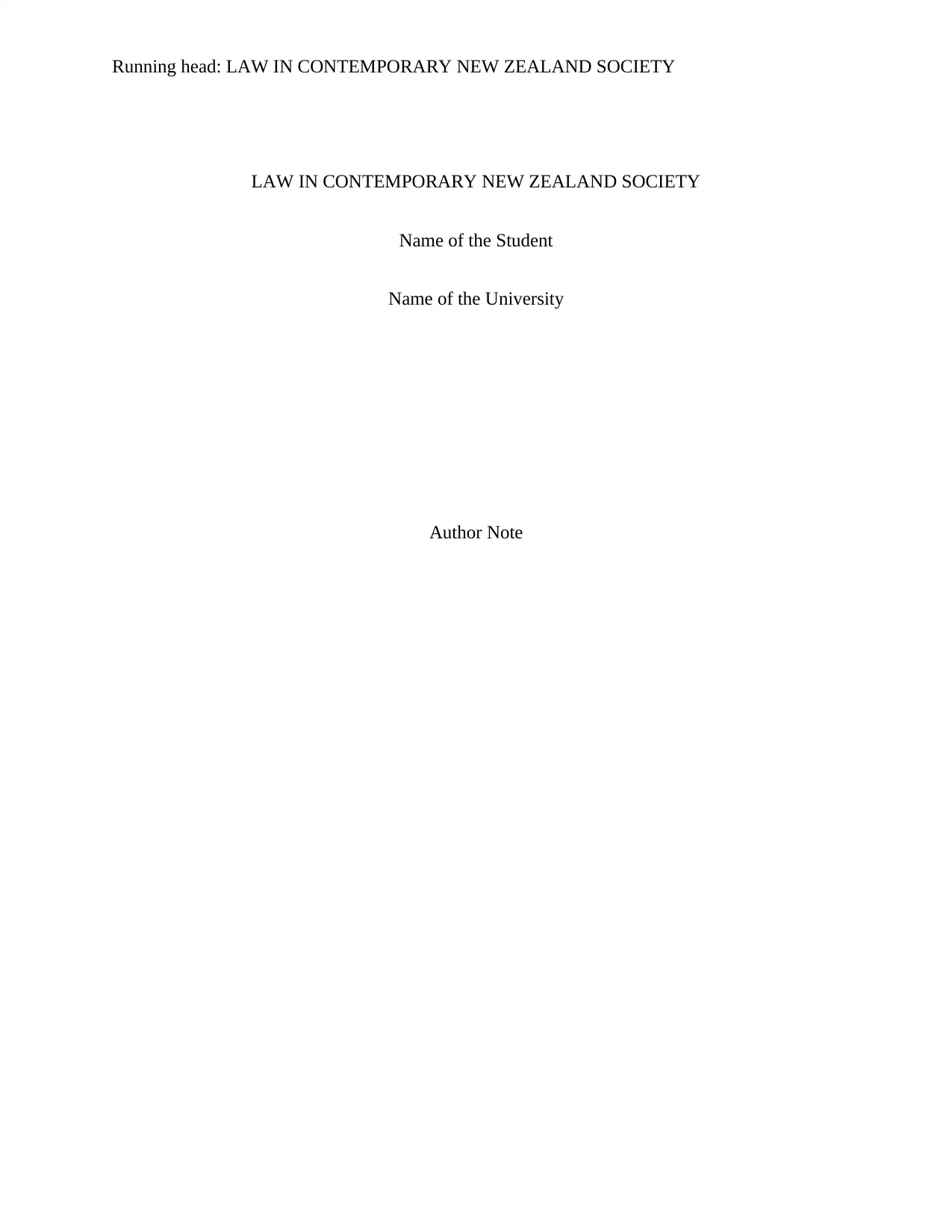
Running head: LAW IN CONTEMPORARY NEW ZEALAND SOCIETY
LAW IN CONTEMPORARY NEW ZEALAND SOCIETY
Name of the Student
Name of the University
Author Note
LAW IN CONTEMPORARY NEW ZEALAND SOCIETY
Name of the Student
Name of the University
Author Note
Paraphrase This Document
Need a fresh take? Get an instant paraphrase of this document with our AI Paraphraser
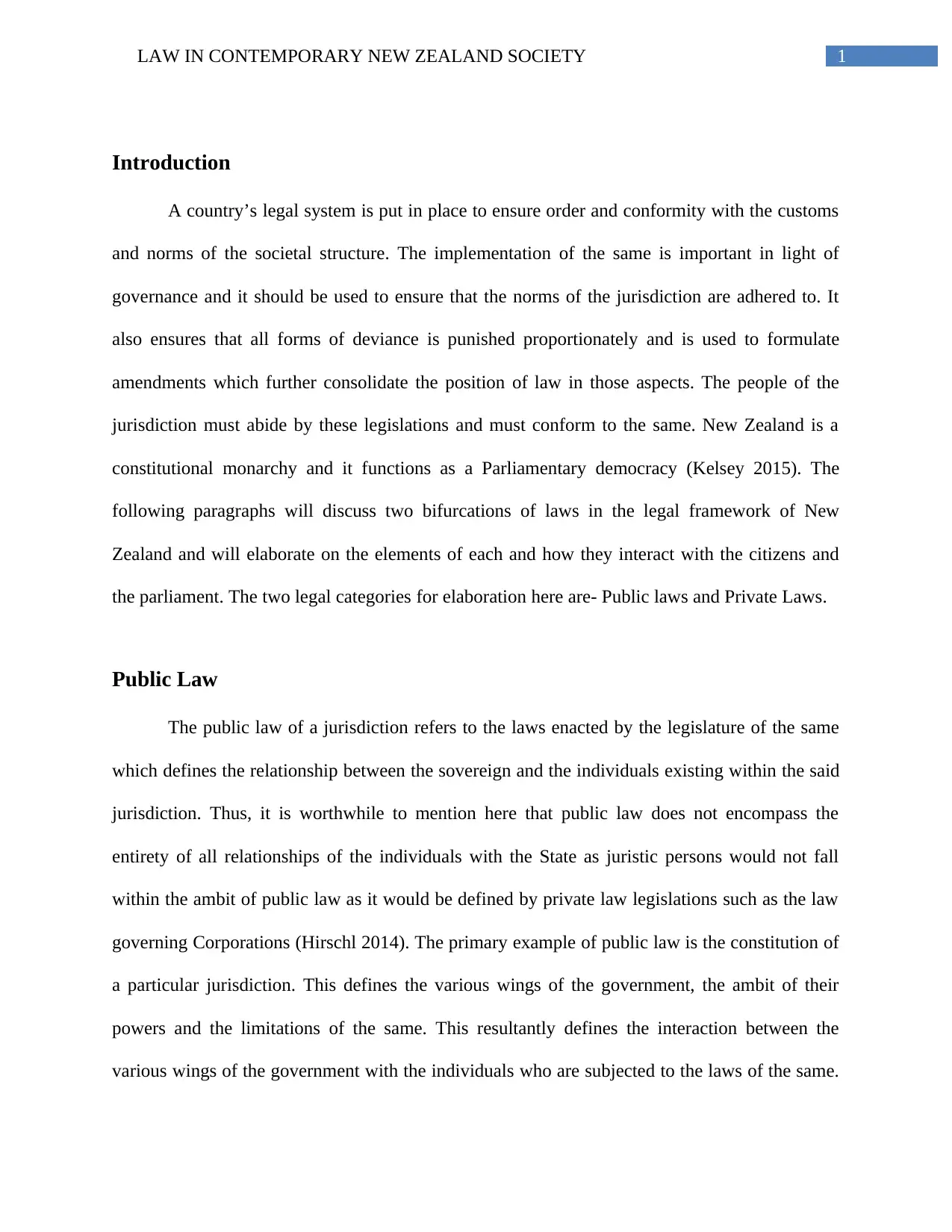
1LAW IN CONTEMPORARY NEW ZEALAND SOCIETY
Introduction
A country’s legal system is put in place to ensure order and conformity with the customs
and norms of the societal structure. The implementation of the same is important in light of
governance and it should be used to ensure that the norms of the jurisdiction are adhered to. It
also ensures that all forms of deviance is punished proportionately and is used to formulate
amendments which further consolidate the position of law in those aspects. The people of the
jurisdiction must abide by these legislations and must conform to the same. New Zealand is a
constitutional monarchy and it functions as a Parliamentary democracy (Kelsey 2015). The
following paragraphs will discuss two bifurcations of laws in the legal framework of New
Zealand and will elaborate on the elements of each and how they interact with the citizens and
the parliament. The two legal categories for elaboration here are- Public laws and Private Laws.
Public Law
The public law of a jurisdiction refers to the laws enacted by the legislature of the same
which defines the relationship between the sovereign and the individuals existing within the said
jurisdiction. Thus, it is worthwhile to mention here that public law does not encompass the
entirety of all relationships of the individuals with the State as juristic persons would not fall
within the ambit of public law as it would be defined by private law legislations such as the law
governing Corporations (Hirschl 2014). The primary example of public law is the constitution of
a particular jurisdiction. This defines the various wings of the government, the ambit of their
powers and the limitations of the same. This resultantly defines the interaction between the
various wings of the government with the individuals who are subjected to the laws of the same.
Introduction
A country’s legal system is put in place to ensure order and conformity with the customs
and norms of the societal structure. The implementation of the same is important in light of
governance and it should be used to ensure that the norms of the jurisdiction are adhered to. It
also ensures that all forms of deviance is punished proportionately and is used to formulate
amendments which further consolidate the position of law in those aspects. The people of the
jurisdiction must abide by these legislations and must conform to the same. New Zealand is a
constitutional monarchy and it functions as a Parliamentary democracy (Kelsey 2015). The
following paragraphs will discuss two bifurcations of laws in the legal framework of New
Zealand and will elaborate on the elements of each and how they interact with the citizens and
the parliament. The two legal categories for elaboration here are- Public laws and Private Laws.
Public Law
The public law of a jurisdiction refers to the laws enacted by the legislature of the same
which defines the relationship between the sovereign and the individuals existing within the said
jurisdiction. Thus, it is worthwhile to mention here that public law does not encompass the
entirety of all relationships of the individuals with the State as juristic persons would not fall
within the ambit of public law as it would be defined by private law legislations such as the law
governing Corporations (Hirschl 2014). The primary example of public law is the constitution of
a particular jurisdiction. This defines the various wings of the government, the ambit of their
powers and the limitations of the same. This resultantly defines the interaction between the
various wings of the government with the individuals who are subjected to the laws of the same.
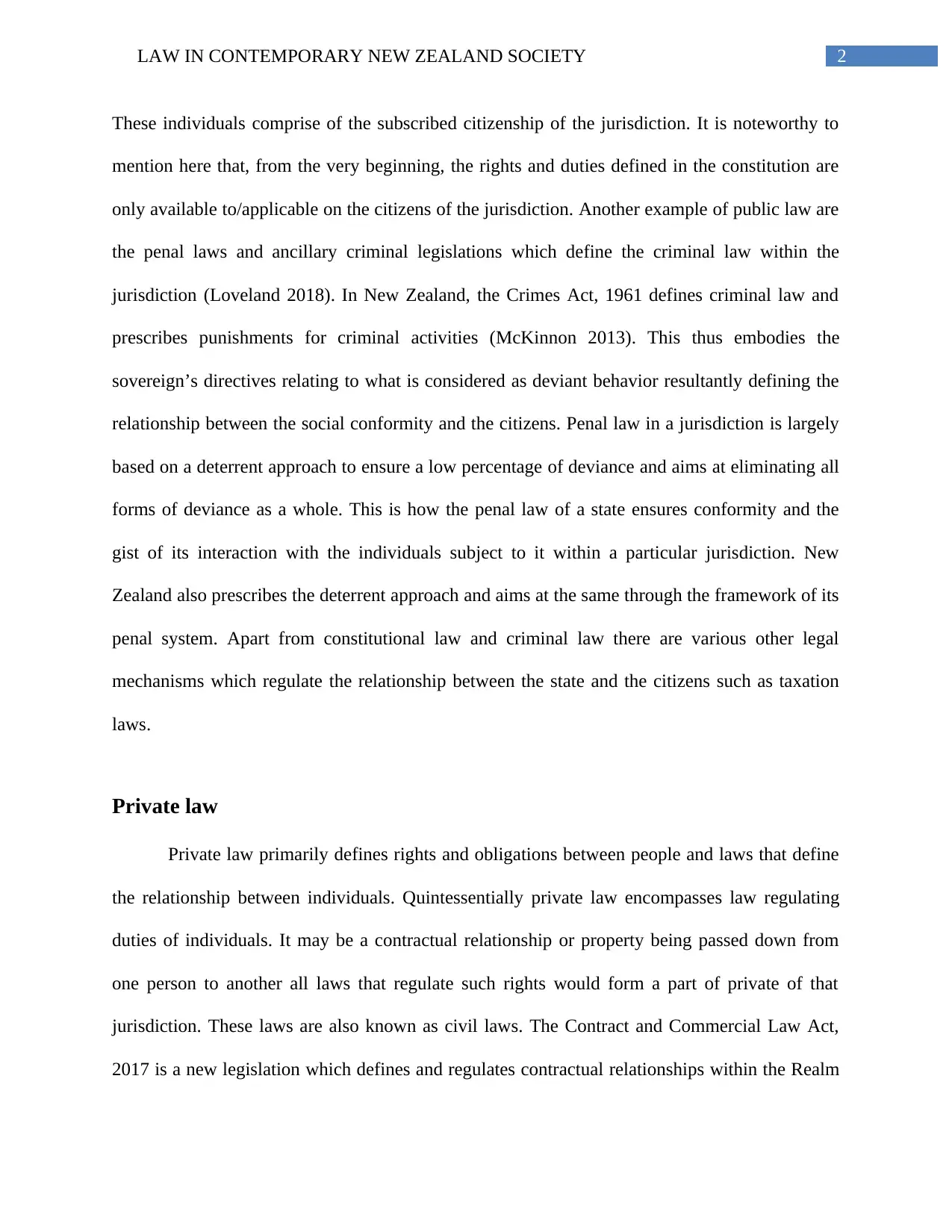
2LAW IN CONTEMPORARY NEW ZEALAND SOCIETY
These individuals comprise of the subscribed citizenship of the jurisdiction. It is noteworthy to
mention here that, from the very beginning, the rights and duties defined in the constitution are
only available to/applicable on the citizens of the jurisdiction. Another example of public law are
the penal laws and ancillary criminal legislations which define the criminal law within the
jurisdiction (Loveland 2018). In New Zealand, the Crimes Act, 1961 defines criminal law and
prescribes punishments for criminal activities (McKinnon 2013). This thus embodies the
sovereign’s directives relating to what is considered as deviant behavior resultantly defining the
relationship between the social conformity and the citizens. Penal law in a jurisdiction is largely
based on a deterrent approach to ensure a low percentage of deviance and aims at eliminating all
forms of deviance as a whole. This is how the penal law of a state ensures conformity and the
gist of its interaction with the individuals subject to it within a particular jurisdiction. New
Zealand also prescribes the deterrent approach and aims at the same through the framework of its
penal system. Apart from constitutional law and criminal law there are various other legal
mechanisms which regulate the relationship between the state and the citizens such as taxation
laws.
Private law
Private law primarily defines rights and obligations between people and laws that define
the relationship between individuals. Quintessentially private law encompasses law regulating
duties of individuals. It may be a contractual relationship or property being passed down from
one person to another all laws that regulate such rights would form a part of private of that
jurisdiction. These laws are also known as civil laws. The Contract and Commercial Law Act,
2017 is a new legislation which defines and regulates contractual relationships within the Realm
These individuals comprise of the subscribed citizenship of the jurisdiction. It is noteworthy to
mention here that, from the very beginning, the rights and duties defined in the constitution are
only available to/applicable on the citizens of the jurisdiction. Another example of public law are
the penal laws and ancillary criminal legislations which define the criminal law within the
jurisdiction (Loveland 2018). In New Zealand, the Crimes Act, 1961 defines criminal law and
prescribes punishments for criminal activities (McKinnon 2013). This thus embodies the
sovereign’s directives relating to what is considered as deviant behavior resultantly defining the
relationship between the social conformity and the citizens. Penal law in a jurisdiction is largely
based on a deterrent approach to ensure a low percentage of deviance and aims at eliminating all
forms of deviance as a whole. This is how the penal law of a state ensures conformity and the
gist of its interaction with the individuals subject to it within a particular jurisdiction. New
Zealand also prescribes the deterrent approach and aims at the same through the framework of its
penal system. Apart from constitutional law and criminal law there are various other legal
mechanisms which regulate the relationship between the state and the citizens such as taxation
laws.
Private law
Private law primarily defines rights and obligations between people and laws that define
the relationship between individuals. Quintessentially private law encompasses law regulating
duties of individuals. It may be a contractual relationship or property being passed down from
one person to another all laws that regulate such rights would form a part of private of that
jurisdiction. These laws are also known as civil laws. The Contract and Commercial Law Act,
2017 is a new legislation which defines and regulates contractual relationships within the Realm
⊘ This is a preview!⊘
Do you want full access?
Subscribe today to unlock all pages.

Trusted by 1+ million students worldwide
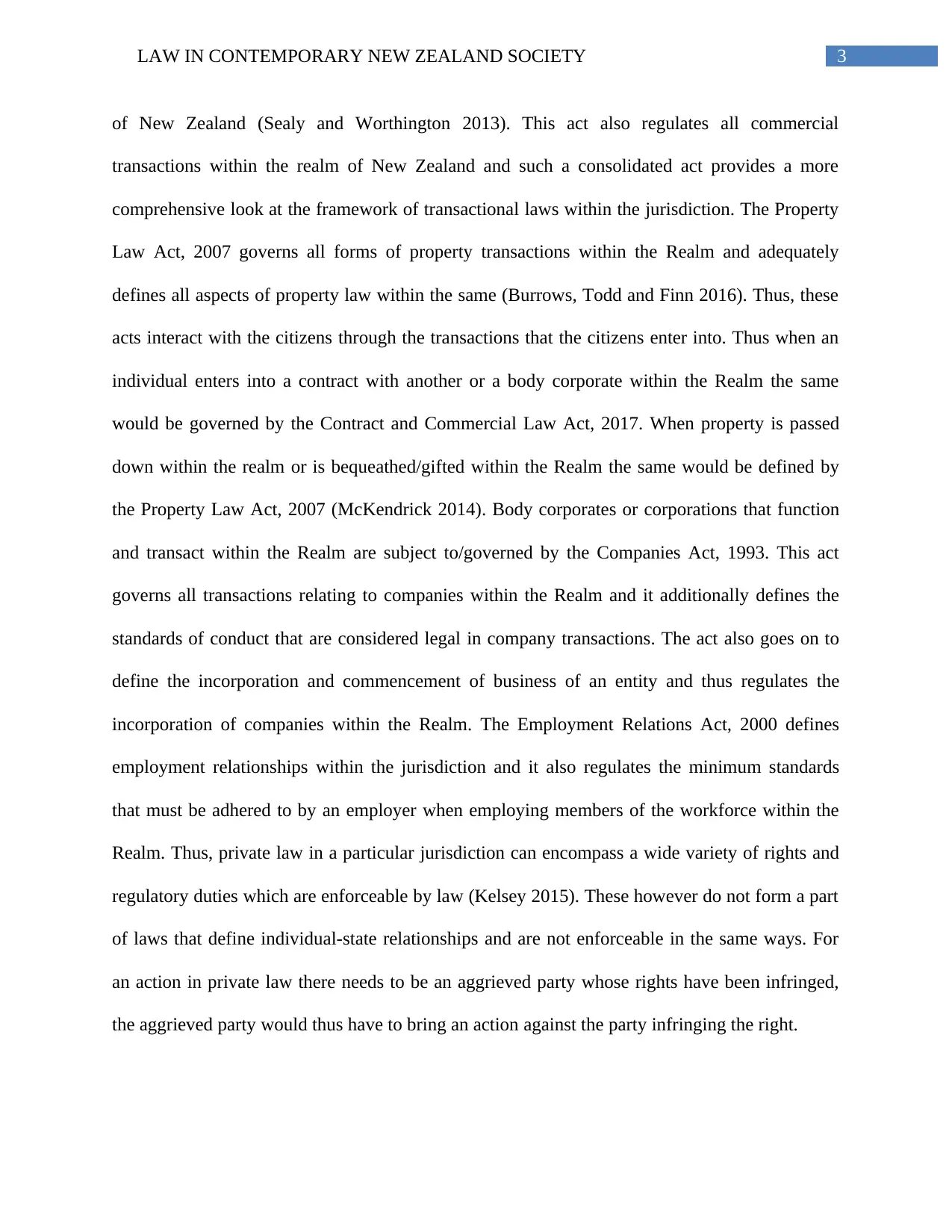
3LAW IN CONTEMPORARY NEW ZEALAND SOCIETY
of New Zealand (Sealy and Worthington 2013). This act also regulates all commercial
transactions within the realm of New Zealand and such a consolidated act provides a more
comprehensive look at the framework of transactional laws within the jurisdiction. The Property
Law Act, 2007 governs all forms of property transactions within the Realm and adequately
defines all aspects of property law within the same (Burrows, Todd and Finn 2016). Thus, these
acts interact with the citizens through the transactions that the citizens enter into. Thus when an
individual enters into a contract with another or a body corporate within the Realm the same
would be governed by the Contract and Commercial Law Act, 2017. When property is passed
down within the realm or is bequeathed/gifted within the Realm the same would be defined by
the Property Law Act, 2007 (McKendrick 2014). Body corporates or corporations that function
and transact within the Realm are subject to/governed by the Companies Act, 1993. This act
governs all transactions relating to companies within the Realm and it additionally defines the
standards of conduct that are considered legal in company transactions. The act also goes on to
define the incorporation and commencement of business of an entity and thus regulates the
incorporation of companies within the Realm. The Employment Relations Act, 2000 defines
employment relationships within the jurisdiction and it also regulates the minimum standards
that must be adhered to by an employer when employing members of the workforce within the
Realm. Thus, private law in a particular jurisdiction can encompass a wide variety of rights and
regulatory duties which are enforceable by law (Kelsey 2015). These however do not form a part
of laws that define individual-state relationships and are not enforceable in the same ways. For
an action in private law there needs to be an aggrieved party whose rights have been infringed,
the aggrieved party would thus have to bring an action against the party infringing the right.
of New Zealand (Sealy and Worthington 2013). This act also regulates all commercial
transactions within the realm of New Zealand and such a consolidated act provides a more
comprehensive look at the framework of transactional laws within the jurisdiction. The Property
Law Act, 2007 governs all forms of property transactions within the Realm and adequately
defines all aspects of property law within the same (Burrows, Todd and Finn 2016). Thus, these
acts interact with the citizens through the transactions that the citizens enter into. Thus when an
individual enters into a contract with another or a body corporate within the Realm the same
would be governed by the Contract and Commercial Law Act, 2017. When property is passed
down within the realm or is bequeathed/gifted within the Realm the same would be defined by
the Property Law Act, 2007 (McKendrick 2014). Body corporates or corporations that function
and transact within the Realm are subject to/governed by the Companies Act, 1993. This act
governs all transactions relating to companies within the Realm and it additionally defines the
standards of conduct that are considered legal in company transactions. The act also goes on to
define the incorporation and commencement of business of an entity and thus regulates the
incorporation of companies within the Realm. The Employment Relations Act, 2000 defines
employment relationships within the jurisdiction and it also regulates the minimum standards
that must be adhered to by an employer when employing members of the workforce within the
Realm. Thus, private law in a particular jurisdiction can encompass a wide variety of rights and
regulatory duties which are enforceable by law (Kelsey 2015). These however do not form a part
of laws that define individual-state relationships and are not enforceable in the same ways. For
an action in private law there needs to be an aggrieved party whose rights have been infringed,
the aggrieved party would thus have to bring an action against the party infringing the right.
Paraphrase This Document
Need a fresh take? Get an instant paraphrase of this document with our AI Paraphraser
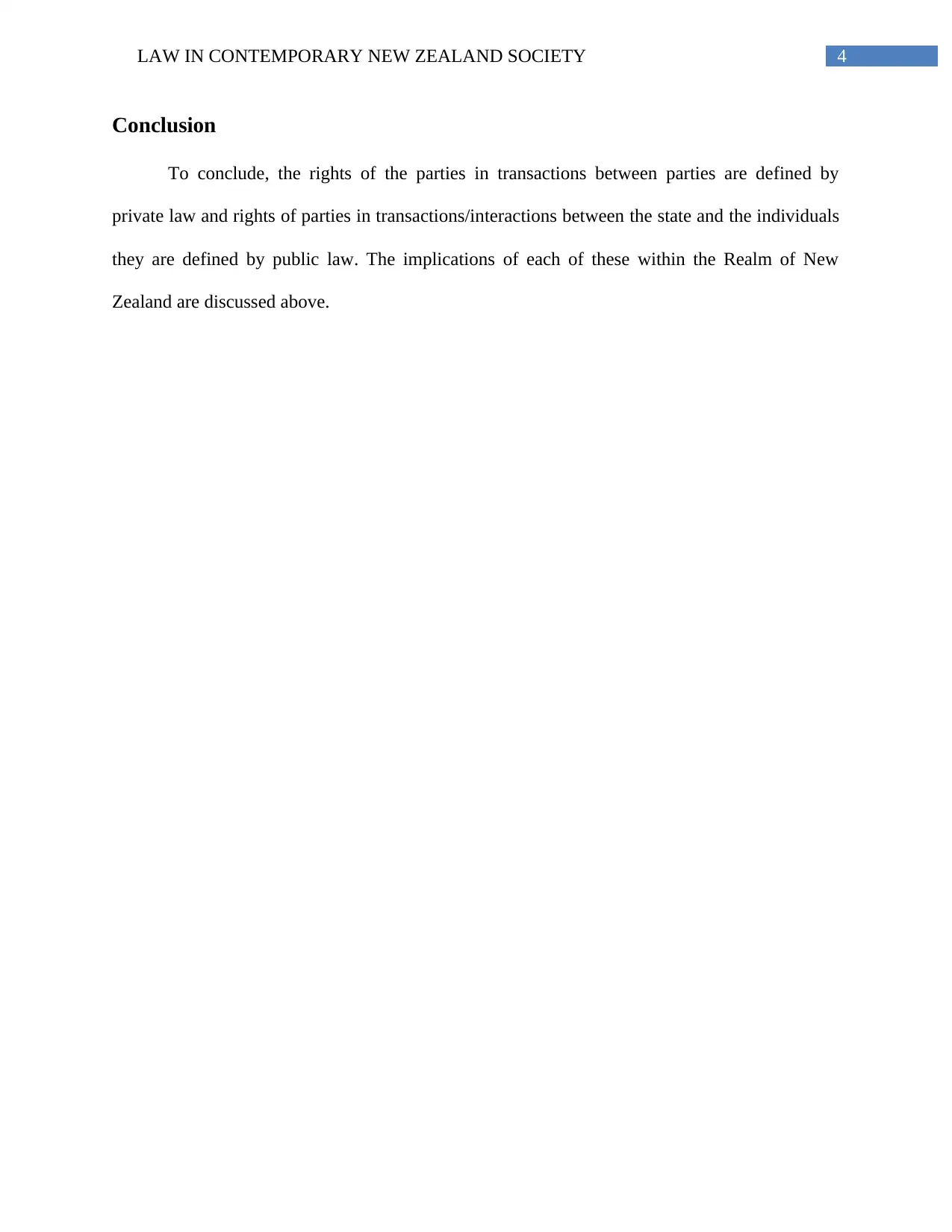
4LAW IN CONTEMPORARY NEW ZEALAND SOCIETY
Conclusion
To conclude, the rights of the parties in transactions between parties are defined by
private law and rights of parties in transactions/interactions between the state and the individuals
they are defined by public law. The implications of each of these within the Realm of New
Zealand are discussed above.
Conclusion
To conclude, the rights of the parties in transactions between parties are defined by
private law and rights of parties in transactions/interactions between the state and the individuals
they are defined by public law. The implications of each of these within the Realm of New
Zealand are discussed above.
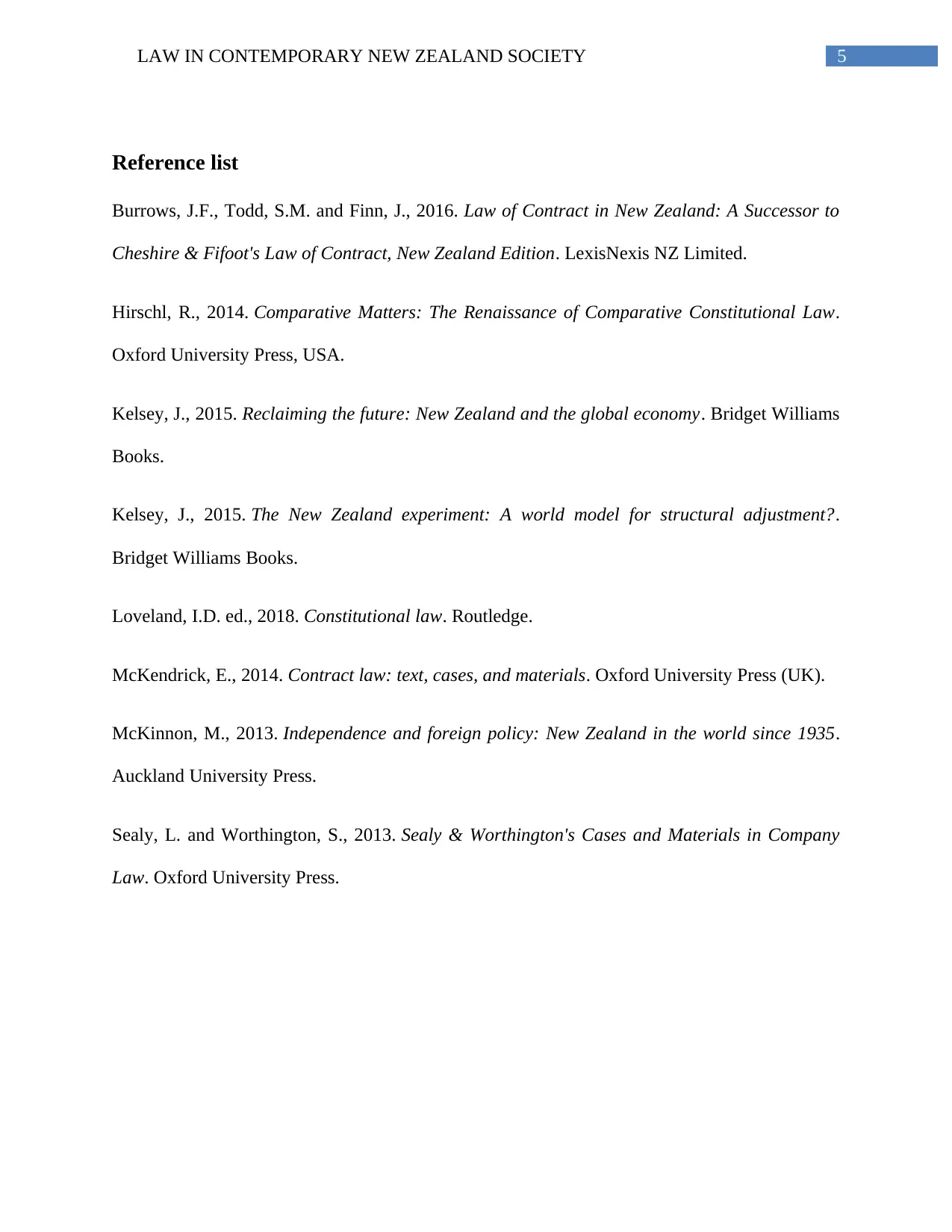
5LAW IN CONTEMPORARY NEW ZEALAND SOCIETY
Reference list
Burrows, J.F., Todd, S.M. and Finn, J., 2016. Law of Contract in New Zealand: A Successor to
Cheshire & Fifoot's Law of Contract, New Zealand Edition. LexisNexis NZ Limited.
Hirschl, R., 2014. Comparative Matters: The Renaissance of Comparative Constitutional Law.
Oxford University Press, USA.
Kelsey, J., 2015. Reclaiming the future: New Zealand and the global economy. Bridget Williams
Books.
Kelsey, J., 2015. The New Zealand experiment: A world model for structural adjustment?.
Bridget Williams Books.
Loveland, I.D. ed., 2018. Constitutional law. Routledge.
McKendrick, E., 2014. Contract law: text, cases, and materials. Oxford University Press (UK).
McKinnon, M., 2013. Independence and foreign policy: New Zealand in the world since 1935.
Auckland University Press.
Sealy, L. and Worthington, S., 2013. Sealy & Worthington's Cases and Materials in Company
Law. Oxford University Press.
Reference list
Burrows, J.F., Todd, S.M. and Finn, J., 2016. Law of Contract in New Zealand: A Successor to
Cheshire & Fifoot's Law of Contract, New Zealand Edition. LexisNexis NZ Limited.
Hirschl, R., 2014. Comparative Matters: The Renaissance of Comparative Constitutional Law.
Oxford University Press, USA.
Kelsey, J., 2015. Reclaiming the future: New Zealand and the global economy. Bridget Williams
Books.
Kelsey, J., 2015. The New Zealand experiment: A world model for structural adjustment?.
Bridget Williams Books.
Loveland, I.D. ed., 2018. Constitutional law. Routledge.
McKendrick, E., 2014. Contract law: text, cases, and materials. Oxford University Press (UK).
McKinnon, M., 2013. Independence and foreign policy: New Zealand in the world since 1935.
Auckland University Press.
Sealy, L. and Worthington, S., 2013. Sealy & Worthington's Cases and Materials in Company
Law. Oxford University Press.
⊘ This is a preview!⊘
Do you want full access?
Subscribe today to unlock all pages.

Trusted by 1+ million students worldwide
1 out of 6
Related Documents
Your All-in-One AI-Powered Toolkit for Academic Success.
+13062052269
info@desklib.com
Available 24*7 on WhatsApp / Email
![[object Object]](/_next/static/media/star-bottom.7253800d.svg)
Unlock your academic potential
Copyright © 2020–2026 A2Z Services. All Rights Reserved. Developed and managed by ZUCOL.




